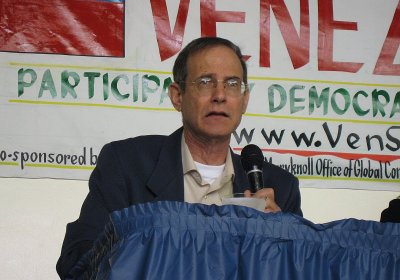Leftists in Venezuela have put forward several explanations for the pressing economic difficulties and growing discontent that have beset the nation recently. These difficulties raise the possibility of an opposition takeover of the National Assembly in this year’s elections.
Puerto La Cruz
It is a point of honour for the Venezuelan government that despite the sharp plunge in oil prices and acute shortages of goods, President Nicolas Maduro has ruled out austerity measures.
In a recent TV interview with former vice president Jose Vicente Rangel, Venezuelan Central Bank president Nelson Merentes explained why, saying: “Do you remember what happened on February 27, 1989?”
The Venezuelan opposition and much of the media use the term “peaceful protests” to distinguish gatherings of protesting students and other young people from the more violent actions by opponents of President Nicolas Maduro's government -- including vandalism and shootings carried out by those outside of the university community.
“Peaceful protests”, however, is a loaded term that serves to plant doubts about the intentions of the Maduro-led Chavista government.
The strategy and tactics of the Venezuelan opposition is a replay of events that took place leading up to the coup against Hugo Chavez on April 11, 2002.
The blatant distortions and in some cases lies of the media — CNN in Spanish playing a lead role — represent an essential element in the strategy.
There are two main groups that the United States-funded right-wing opposition has mobilised. From all appearances, the two act in coordination even though their style, and even social background, differs.
Since the 1990s, many critics of the United States have accused Washington of promoting the dismemberment of nations such as Yugoslavia, in accordance with neoliberalism’s drive to weaken central governments and nation states.
Today, Washington’s official policy in nations like Syria and now the Ukraine has been support for rebels seeking to overthrow the government, even though their chances of success are minimal.
The slant of Venezuela’s private media and the international media on what is happening in Venezuela is clear: The government is responsible for the violence.
In the first place, it is said, government-ordered gunmen are shooting at peaceful demonstrators and the violence generated by the opposition is just a response to the brutality of police and military forces.
But there is considerable evidence that shows the violence, including that of unidentified motorcyclists against demonstrators, is being carried out by the opposition. Consider the following:
On September 28, a British Guardian reporter who interviewed me by phone published an article on the September 26 Venezuelan National Assembly elections titled “Opposition Gains Loosen Chavez’s Grip on Power.”
According to the article, I said the electoral results “suggested the government should try to modify its radical discourse and accommodate the opposition, as long as it accepted the government’s legitimacy”.






